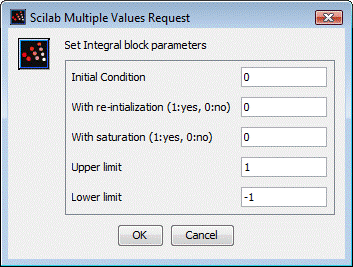Please note that the recommended version of Scilab is 2026.0.1. This page might be outdated.
See the recommended documentation of this function
INTEGRAL_m
Integration
Block Screenshot

Contents
Palette
Description
This block is an integrator. The output y is the integral of the input u at the current time step t.

Dialog box
The parameter dialog box allows you to define:
The initial condition with or without saturation limit.
The upper and lower limits on the integral.
It allows you also to add an event port to the block in order to reset its sate to the specified initial condition.
In this case, the value of the reset signal depends on an external signal.

Initial Condition
A vector/scalar initial conditions.
With that parameter, one can define the datatype of the input/output. It can be a real or a complex type.
Properties : Type 'mat' of size [-1,-1].
With re-initialization
To reset its state to the specified initial condition based on an external signal select1 .
Properties : Type 'vec' of size 1.
With saturation
If selected, limits the states to a value between the Lower saturation limit and Upper saturation limit parameters.
Properties : Type 'vec' of size 1.
Upper limit
The upper limit for the integral.
Properties : Type 'mat' of size [-1,-1].
Lower limit
The lower limit for the integral.
Properties : Type 'mat' of size [-1,-1].
Default properties
always active: yes
direct-feedthrough: no
zero-crossing: no
mode: no
regular inputs:
- port 1 : size [1,1] / type 1
regular outputs:
- port 1 : size [1,1] / type 1
number/sizes of activation inputs: 0
number/sizes of activation outputs: 0
continuous-time state: yes
discrete-time state: no
object discrete-time state: no
name of computational function: integral_func
Example
This sample model demonstrates how to use the integrator's state port.
The re-initialization parameter is set to 1, the Upper limit to 1 and the lower limit to -1.

Interfacing function
SCI/modules/scicos_blocks/macros/Linear/INTEGRAL_m.sci
Computational function
SCI/modules/scicos_blocks/src/c/integral_func.c
SCI/modules/scicos_blocks/src/c/integralz_func.c
Authors
Fady NASSIF INRIA
Alan Layec INRIA
Ramine Nikoukhah INRIA
Zhour Madini-Zouine DIGITEO
| << INTEGRAL_f | Continuous time systems palette | PID >> |